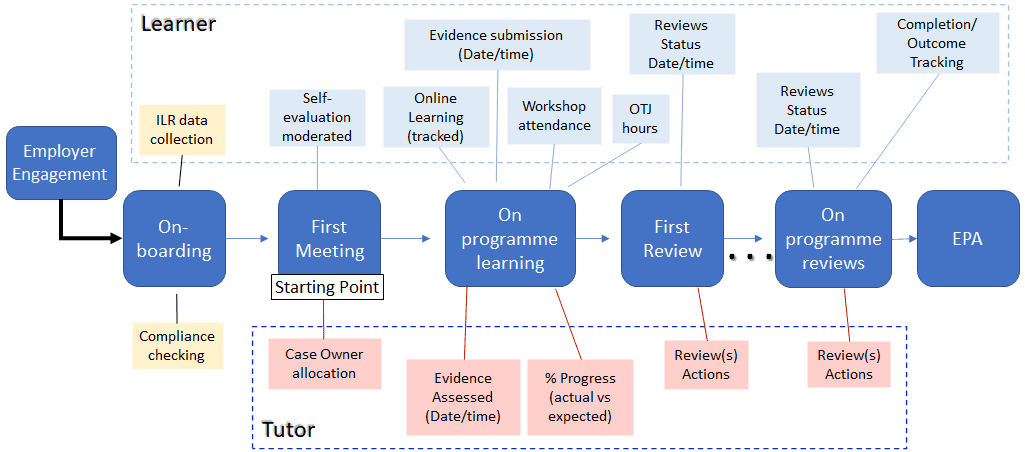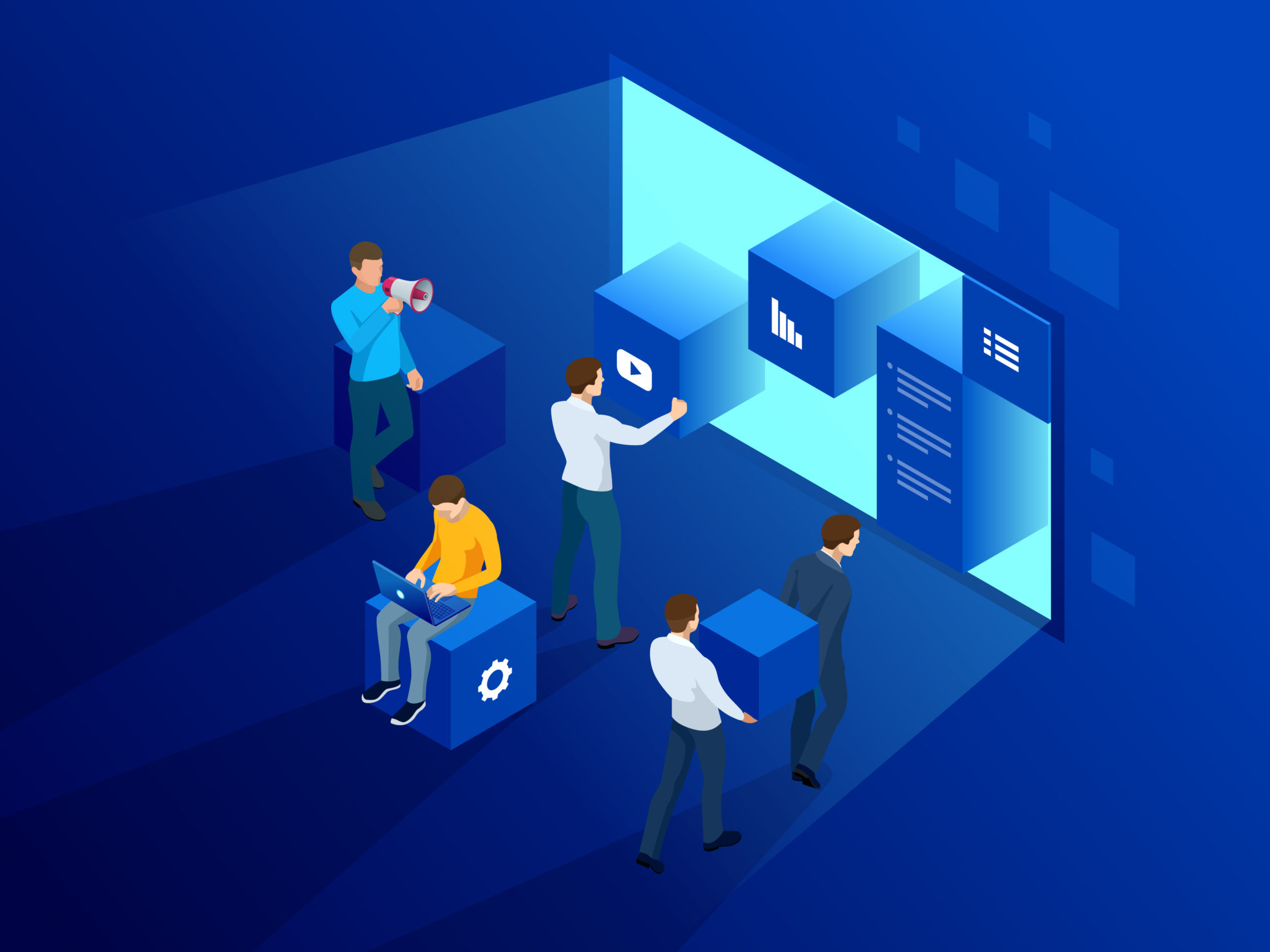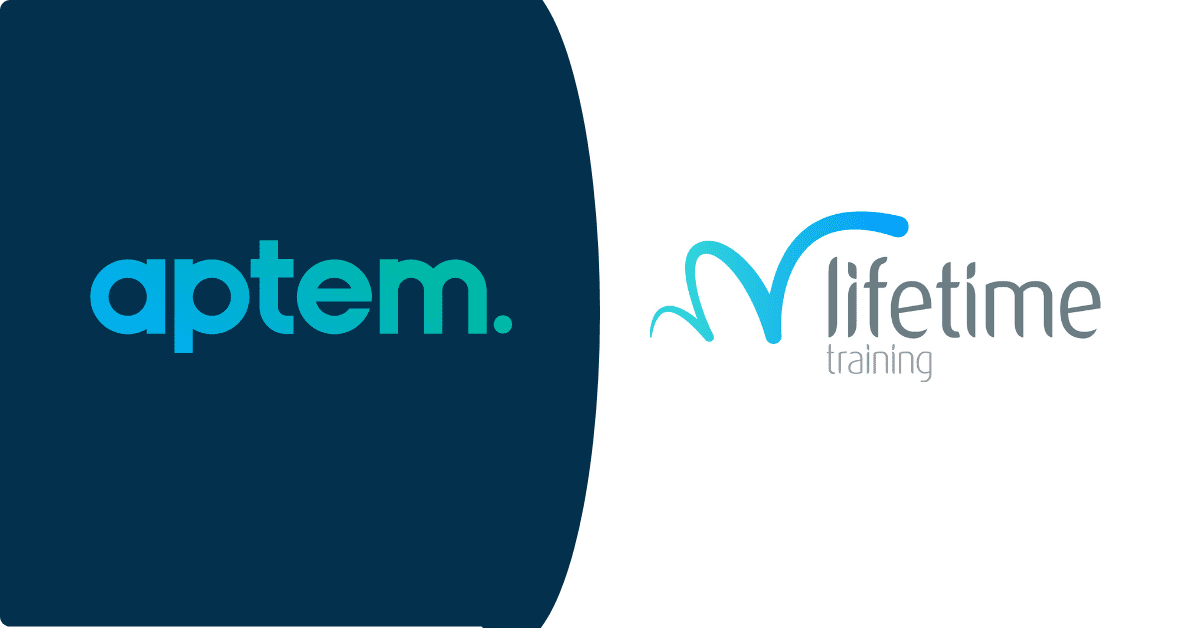Analytics are essential to deliver on defining characteristics of high quality learning programmes. Here, we explore how and where analytics can play an important role in the delivery of effective learning programmes.
Continue readingRecovery and renewal: Reflections from the Employment & Skills Convention 2021
Following the Employment and Skills Convention 2021, Richard Alberg, Chief Executive Officer at Aptem reflects on the event and the heightened focus required to connect more jobseekers to the right provisions, at the right time.
Continue readingHow the pandemic has deepened existing inequality especially within employability
The last 18 months have been transformative, the coronavirus crisis spearheaded intense change throughout society. Read our news article featured in FE News, which explores inequality in relation to employability.
Continue readingEnrolling students remotely, with City College Plymouth and Aptem Enrol
Mike Jones from City College Plymouth and David Devine from Aptem discussed the benefits of remotely enrolling college students. Mike shared learnings and advice gained from using this system throughout the pandemic period, to continue delivering a high quality enrolment experience for students.
Continue readingAptem Product Feature: Customisation – the ability to change the onboarding experience per programme.
Programme flexibility is essential in ensuring learners’ individual needs are met. That’s why Aptem has in-built customisation available, which gives you the ability to customise the onboarding and learner experience per programme.
To ensure that you can deliver the best possible learner experience, Aptem has simplified the process of creating customisable onboarding processes. You can create changes that best suit each programme at the click of a button.
Learner experience doesn’t start with learning delivery. The entire learner journey should consist of considered interactions that keep the learner engagement throughout the entire process. The first of these interactions, with you as a provider, is the enrolment experience.
Aptem allows you to design each aspect of the enrolment experience, from beginning to end. The first interaction learners have with the system should be clear and succinct. Aptem allows you to present an initial page that is not overloaded with information, is manageable and most importantly does not force a learner into form-filling before they’ve had a chance to understand who you are as an organisation and what you provide. This helps to prevent learner disengagement. It ensures your first interaction with the learner is informative and positive.
Data
Data is an essential aspect of programme building and so form-filling will form a significant part of learner onboarding. However, it can be done in a way that encourages participation and reduces the amount of time learners need to spend on what can sometimes be a fairly arduous task.
Aptem allows you to customise forms easily so they are grouped into sections and have further relevant questions revealed using case logic. This reduces the need for learners to use the ‘not applicable’ option, making the process more streamlined and accessible. We suggest that forms are used sparingly and are customised to capture only the datapoints you need and keep forms streamlined. Additionally, don’t end the onboarding experience with a form. Aim to keep forms in the middle of the onboarding journey for best results.
Skills and assessment
During onboarding, there is often a need to assess the starting knowledge of a learner to understand what level of apprenticeship they may need, or to understand eligibility. This is commonly done using a skill scan graded against the Knowledge, Skills and Behaviours from the Standard. Often these skill scans are not accessible due to the language or grading system used. This can appear to be arbitrary to a new learner who may not have been exposed to this type of grading system before. It’s important that when creating an assessment of skills you customise it to ensure it is relatable to your target learners.
At this stage of onboarding, we suggest you use questions within the self-assessment. Utilise the Skills Scan technology to find out more about the learner and their job role. Then, complete the full KSB assessment at a later stage.
Similarly, many onboarding programmes require an initial assessment, which may be a functional skills assessment or a Cognassist assessment. Often learners are presented with a link to the assessment with no additional information about it or why they need to complete it. It’s important to customise the initial assessment experience to maintain learner engagement.
One way this can be done in Aptem is to edit the page so it shows an overview of what the assessment is, what it entails, and give an estimated completion time. You can also include the reason it’s important and the information that you, the provider, will gain from the learner completing the assessment. This helps the learner to feel part of the on-boarding process. Doing so increases participation rates, morale and engagement.
Onboarding is often your first interaction with a learner. It is the first opportunity to provide a positive learner experience. Customisation can help you curate an experience that is engaging, interactive and ensures that the learner journey is collaborative and successful.
Please note that certain features and functionality highlighted here are exclusive to specific Aptem packages. Please speak to your Business Development Manager, or Customer Success Manager if you are already an Aptem customer, for further information.
Data Masterclass output – Moving away from being Data Rich Insight Poor
Are you data rich but insight poor in your organisation?
Mark Abrahams, Head of Research at Aptem, joined Kerry Boffey from the Fellowship of Inspection Nominees (FIN) to host a Data masterclass for 23 organisations. The focus of the session was how to move away from being a ‘Data Rich Insight Poor’ (DRIP). Most of the participants were relying on Excel to process, analyse and present data. Some were moving towards Tableau or PowerBI. The merits of these and other analytics tools were discussed.
The masterclass
Organisations worked through using data to support their Covid story. They also identified the types of data they needed to support their statements for regulatory bodies like Ofsted. While most organisations are easily able to articulate what actions they have taken, data provides evidence of the impact of the action taken.

A core focus of the session was the learner journey and the importance of building a story around the data that is collected. Mark shared a diagram that walked organisations through the data points that are captured along the route and asked “what’s missing?” Together, organisations discussed the business questions they need to ask. The importance of triangulation was presented to ensure claims are evidenced using robust, accurate data.
Operational challenges were worked through across a range of perspectives including learners, tutors, quality and compliance and finance. Solutions using data to identify and solve organisational pain points such as identifying learners at risk, marking behaviours of tutors, patterns of tutor behaviour – both positive and negative – and past, current and future performance, were presented and worked through.
Data exercises
Two data exercises were undertaken by participants to test their learnings on dummy data. A discussion followed about the importance of data visualisation. Participants explored which tools to use for data analysis and presentation. Tips were given on how to present data in a consumable format, which metrics were important, and how to automate to reduce manual effort and errors.
The session ended with the value of benchmarking data. It highlighted the importance of using freely available tools such as the Aptem Intelligence Dashboard, to identify growth areas, opportunities and threats at an organisational level.
Feedback
Feedback from this masterclass was extremely positive:
· “The training was comprehensive and clear. Detailed slides to continue to develop as an organisation from the training” Real Skills Training Ltd.
· “Very informative, firm, and good fun – if stats can ever be that!” Professor Christine White, De Montfort University.
· “Short but packed with information, interactive, networked with others. Useful with lots of take-away thoughts” Jenny Scrivens, Achieve Training.
Aptem, in partnership with FIN, runs a range of thought-leadership masterclasses throughout the year. These masterclasses are available to all Aptem customers at a discounted rate. Customers are contacted in advance of these sessions via email.
Lifetime and Aptem: Sharing the selection process
The methodology involved in Lifetime Training’s procurement of an apprenticeship delivery platform
In March 2021, following a year long procurement process, Lifetime, the largest training provider in the UK, signed up to the award-winning end-to-end platform, Aptem, to deliver its apprenticeships and Kickstart programmes.
Lifetime Training
Lifetime Training has built a strong reputation for delivering award-winning training programmes to 20,000 learners a year. As you would expect from a company with this reputation its approach to procuring a new system was robust, methodical and highly detailed. The process involved a year long consultation period, over 100 hours of pre-contract sessions, and a three-stage approach. The company sought to replace its proprietary systems with an ‘all in one place’ apprenticeship and vocational training delivery platform, to manage all aspects of its programmes.
Key to this successful approach was a small group of senior level, highly knowledgeable people, on both sides of the partnership, who stayed with the project throughout.
“Right from the start it became clear that we needed a system which would both simplify and enhance the learning experience for our learners. We needed something flexible, that we could customise for our needs and maintain our unique, high-quality curriculum and training delivery model. Absolutely key to our selection was finding a company who we could create a genuine partnership with.” Mark Denton, IT and Learning Technologies Director.
Stage one: Initial engagement
The process for Lifetime was collaborative across a number of departments. They kept asking themselves ‘what are the problems we are trying to fix’. It commenced with a series of detailed deep dives into all aspects of the system, from pre-enrolment, through ILR, funding, the learner journey and more. Every area of the system was walked through in detail. All sessions were recorded and the team at Lifetime frequently went back through these recordings to confirm their understanding.
A future-proof system
A critical requirement from any system was that it met Lifetime’s aspirational development goals over the next five years. Aptem’s roadmaps closely aligned with Lifetime’s requirements. The Aptem team’s approach to problem solving was also a primary reason for selection. “Their solution to handling multiple programmes through their sub-programme solution, which went live recently, was a great example of this.” Mark Denton, IT and Learning Technologies Director.
Stage two: The discovery phase
The discovery phase involved a set of very detailed workshops where the project team from Aptem and Lifetime walked through and understood Lifetime’s various business processes, before recommending a solution and way of working using Aptem.
The team remained consistent throughout this period. This ensured learnings gained over the previous months were not lost. This was particularly important as the stakeholder group broadened out. “The discovery phase was very much about our team at Aptem understanding Lifetime’s business processes and how their existing systems work, so that we could ensure that our system not only replicated but went a stage further,” explains Shaun Elliott, Product Director at Aptem. “This phased implementation allowed us to make recommendations to Lifetime about how to get the most out of the product, to fulfil their organisational requirements and objectives.”
A great example of this was the immediate requirement for Lifetime to use the system to support Kickstart in quarter one 2021. Aptem already has an inbuilt product to support the major employability contracts including Kickstart, so Lifetime was able to access it and start delivering Kickstart placements for young people.
A phased implementation
During this phase, a group of Lifetime learners commenced their programmes using Aptem. This implementation was supported by a dedicated Project Manager at Aptem alongside the Implementation Consultant.
Aptem received great feedback from Lifetime’s coaches and their learners during this discovery phase.
“Great system, learners have liked it. It’s easy and quick to use. It flows well and is easy to navigate.” Sharath, Coach.
“Easy to use, user friendly, and makes coaches lives easier.” Kirsty, Coach.
“I like the fact that our view is the same as the learners and you can see how long they spend on activities.” Tom, Coach.
Stage three: Roll out
Lifetime has now entered a phased roll out plan for the majority of their learners that is due to complete by the end of 2021. Using a ‘train the trainer’ approach, supported by bespoke documentation, dedicated trainers at Lifetime are disseminating information about Aptem through the business.
Key to this partnership has been the collaborative approach throughout the procurement process. “This has been a consultative approach. Aptem really sought to understand our business, our processes, our products, and provide a solution that works for us both now and in the future. We have been delighted by the feedback received from learners and tutors during the phased implementation. We look forward to continuing to work in partnership with Aptem for many years.” Carl Cornish, Chief Operating Officer.
Why skills matter to individuals, the economy and society.
Read Aptem’s recently published a white paper illustrating the state of skills, referencing statistical data and outlining three ways skills matter to individuals and the economy.
Continue readingMWS Technology, Aptem: British Data Awards Winner 2021
MWS Technology has been named winner at the British Data Awards 2021! It took the prize in the ‘SME of the Year’ category.
Our entry centred on our long-standing contribution to SaaS innovation around skills and employability. It cited the evolution of MyWorkSearch into Aptem Employ and our transformation of the EdTech learning delivery space for apprenticeships and skills. We highlighted our resilient performance during the pandemic, growing customers, staff and billable learners. We also relaunched our employability platform to help tackle unemployment and under-employment.
Richard Alberg, CEO of MWS Technology, said:
“We are delighted to have been declared SME of the Year by the British Data Awards judges. Our achievement is testament to all the hard work our staff have done from the founding of MWS Technology Ltd to now.
“I am particularly proud of how we have survived and thrived throughout the pandemic, offering training providers and the employability sector a platform that enables them to deliver programmes online and remotely. This has not been without its challenges, but one thing we can say for sure is that MWS Technology will always be looking to problem-solve, improve and innovate for the benefit of its customers.”
The British Data Awards is an annual campaign that celebrates the organisations and people that are deeply passionate about data. It helps to uncover data success stories. Organisations taking part this year include FTSE 100 giants, tech unicorns, innovative start-ups, large public sector bodies, agile not-for-profits, and everything in between.
Jason Johnson, Co-Founder of Predatech and British Data Awards judge said:
“I’d like to extend my congratulations to all our 2021 winners. With 149 entries received this year, being named a winner is a great achievement. All organisations should feel immensely proud. I’m really excited to see what the next 12 months holds for our winners.”
Every region of the UK is represented among the British Data Awards 2021 finalists. Organisations based in London make up 35% of the winners and runner-ups. 13% are based in the South West, while the South East, Yorkshire and the Humber and Scotland are each home to a further 10% of the winners and runner-ups.
The 2021 judges included: Neil Carden, COO of Forth Point, Jason Johnson, Co-Founder of Predatech, Mahana Mansfield, Data Science Director at Deliveroo, Tej Parikh, Chief Economist at the Institute of Directors, Harriet Rees, Head of Data Science at Starling Bank and Dr Jo Watts, CEO and Founder of Effini.
The British Data Awards are run by Predatech, a cyber security company that helps organisations to protect their businesses, their customers, as well as their data.
Aptem product feature: Sub-programmes
Learners are unique and their requirements for learning journeys vary. This is why flexible, personalised approaches to learner programme delivery are essential in ensuring successful learning experiences for all.
Within any programme, there are elements of a learning plan that will be applicable to all learners. Then, some to a subset of learners, and others will only apply to individual learners.
To enable the delivery of a best-in-class learner experience, Aptem has simplified the process of managing curriculum delivery through the creation of sub-programmes.
What are sub-programmes?
Sub-programmes provide the ability to manage learning plan content more easily, without the need for excessive administrative load. Learning plan delivery is significantly more flexible with sub-programmes. Individual elements of your learning plan can be broken out, for example, Functional Skills or optional qualifications. This eliminates the need to have multiple versions of an individual programme for the same apprenticeship. The elements of the programme that are not needed for every learner can instead exist as a sub-programme. Doing so ensures that every learner’s need is catered for within a single fluid programme.
Tasks that may previously have been time-consuming are simplified using sub-programme functionality. Sub-programmes do have multiple different use-cases. But, they are particularly applicable in programmes that need to deliver to learners with different functional skills needs, e.g. different IA results or prior learning. It is also successful when used to manage cases where all learners may have a core set of learning to complete, with some learners needing access to options outside this core offering such as different or additional qualifications. Learner programmes that include multiple different specialisms are also simplified through the use of sub-programmes.
How sub-programmes work
Learners can be enrolled on a delivery programme, and one or more sub-programmes, as needed. Take functional skills as an example. If learners require functional skills, they can be enrolled on the functional skills sub-programmes. If they are exempt, they will remain enrolled only on the core delivery programme. This process is also relevant for learners who want or need to complete an optional qualification. Enrolled learners will see a single learning plan that contains all the elements of both the delivery programme and any sub-programme. Learning plan and individualised learner record (ILR) elements are seamlessly merged with the delivery programme in one view.
Configuring the ILR template with component aims in a sub-programme means that when the learner is enrolled a single, amalgamated ILR will be generated with the main aim and any component aims from the selected sub-programmes. This saves significant time and effort on having to update them manually. Sub-programmes also enable you to add qualifications for Awarding Body registration, in a similar way to the ILR. Any qualifications from the delivery programme and selected sub-programmes will be added to be registered in the Awarding Body registration section, unless marked as exempt at enrolment.
Personalisation can enhance the effectiveness of learner programme delivery. Identifying and implementing digital technology that enables learners to follow individualised learner pathways should be a priority for all programme providers.
Please note that certain features and functionality highlighted here are exclusive to specific Aptem packages. Please speak to your Business Development Manager, or Customer Success Manager if you are already an Aptem customer, for further information.










